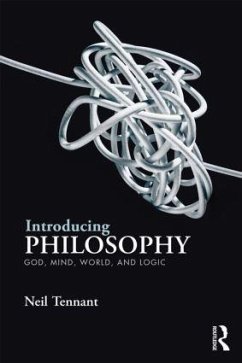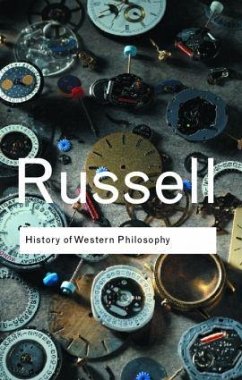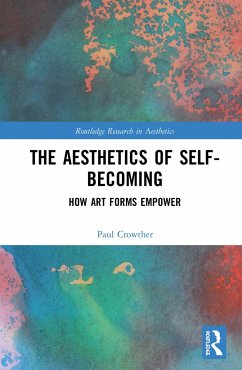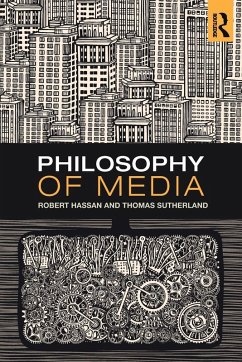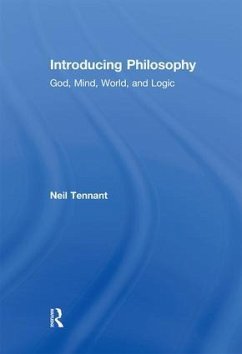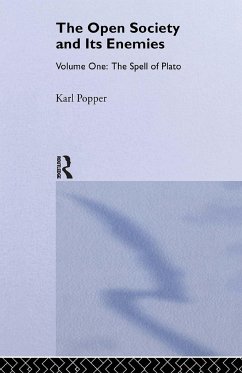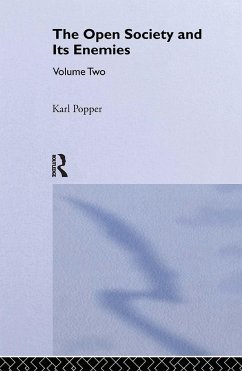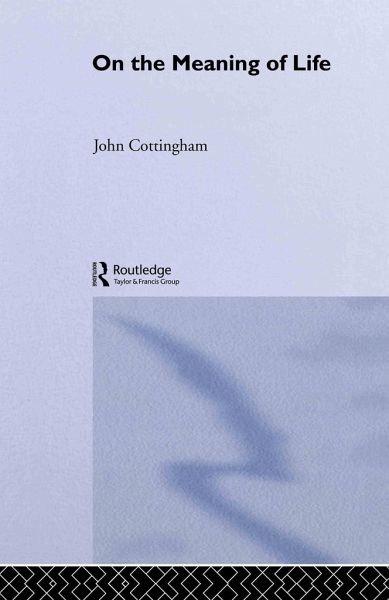
John Cottingham
Gebundenes Buch
On the Meaning of Life
Versandkostenfrei!
Versandfertig in 1-2 Wochen

PAYBACK Punkte
85 °P sammeln!





The question 'What is the meaning of life?' is one of the most fascinating, oldest and most difficult questions human beings have ever posed themselves. In an increasingly secularized culture, it remains a question to which we are ineluctably and powerfully drawn.
Drawing skillfully on a wealth of thinkers, writers and scientists from Augustine, Descartes, Freud and Camus, to Spinoza, Pascal, Darwin, and Wittgenstein, On the Meaning of Life breathes new vitality into one of the very biggest questions.
Drawing skillfully on a wealth of thinkers, writers and scientists from Augustine, Descartes, Freud and Camus, to Spinoza, Pascal, Darwin, and Wittgenstein, On the Meaning of Life breathes new vitality into one of the very biggest questions.
Cottingham, John
Produktdetails
- Thinking in Action
- Verlag: Taylor & Francis
- Artikelnr. des Verlages: RU22278
- Seitenzahl: 136
- Erscheinungstermin: 14. November 2002
- Englisch
- Abmessung: 222mm x 145mm x 11mm
- Gewicht: 238g
- ISBN-13: 9780415247993
- ISBN-10: 0415247993
- Artikelnr.: 13723044
Herstellerkennzeichnung
Libri GmbH
Europaallee 1
36244 Bad Hersfeld
gpsr@libri.de
'Cottingham summarises arguments about morality, evolution ... with clarity.' - Steven Poole, The Guardian
'Students are often disappointed with contemporary philosophy for not engaging with the "big questions". They would not be disappointed with this book...The strength of this book lies in the way it handles a mass of philosophical, scientific, literary and religious thought.' - Church Times
'Elegantly written and accessible...Readers will appreciate Cottingham's clarity and his willingness to enter some difficult and complex areas of debate.' - The Philosophers' Magazine
'Lucid and provocative, rich with references and ideas
'Students are often disappointed with contemporary philosophy for not engaging with the "big questions". They would not be disappointed with this book...The strength of this book lies in the way it handles a mass of philosophical, scientific, literary and religious thought.' - Church Times
'Elegantly written and accessible...Readers will appreciate Cottingham's clarity and his willingness to enter some difficult and complex areas of debate.' - The Philosophers' Magazine
'Lucid and provocative, rich with references and ideas
Mehr anzeigen
. . . Cottingham takes things remarkably far for our day and age.' - International Philosophical Quarterly
'I strongly recommend this book to philosophers, theologians and educated readers. It is a distillation of much experience, scholarship and reflection and it is rare to find so much contained in so few pages. Whatever else I read in the coming months this will be one of my books of the year.' - John Haldane, The Tablet
'[An] admirable, concise and lucid book.' - Reviews in Religion and Theology
'If Cottingham is brusque he can also be invigorating, and he focuses very effectively on the most fertile question in the so-called philosophy of life: that the "precariousness of human life and happiness" is exactly what makes our life interesting.' - Jonathan Ree, Times Literary Supplement
'I strongly recommend this book to philosophers, theologians and educated readers. It is a distillation of much experience, scholarship and reflection and it is rare to find so much contained in so few pages. Whatever else I read in the coming months this will be one of my books of the year.' - John Haldane, The Tablet
'[An] admirable, concise and lucid book.' - Reviews in Religion and Theology
'If Cottingham is brusque he can also be invigorating, and he focuses very effectively on the most fertile question in the so-called philosophy of life: that the "precariousness of human life and happiness" is exactly what makes our life interesting.' - Jonathan Ree, Times Literary Supplement
Schließen
'Cottingham summarises arguments about morality, evolution ... with clarity.' - Steven Poole, The Guardian
'Students are often disappointed with contemporary philosophy for not engaging with the "big questions". They would not be disappointed with this book...The strength of this book lies in the way it handles a mass of philosophical, scientific, literary and religious thought.' - Church Times
'Elegantly written and accessible...Readers will appreciate Cottingham's clarity and his willingness to enter some difficult and complex areas of debate.' - The Philosophers' Magazine
'Lucid and provocative, rich with references and ideas . . . Cottingham takes things remarkably far for our day and age.' - International Philosophical Quarterly
'I strongly recommend this book to philosophers, theologians and educated readers. It is a distillation of much experience, scholarship and reflection and it is rare to find so much contained in so few pages. Whatever elseI read in the coming months this will be one of my books of the year.' - John Haldane, The Tablet
'[An] admirable, concise and lucid book.' - Reviews in Religion and Theology
'If Cottingham is brusque he can also be invigorating, and he focuses very effectively on the most fertile question in the so-called philosophy of life: that the "precariousness of human life and happiness" is exactly what makes our life interesting.' - Jonathan Ree, Times Literary Supplement
'Students are often disappointed with contemporary philosophy for not engaging with the "big questions". They would not be disappointed with this book...The strength of this book lies in the way it handles a mass of philosophical, scientific, literary and religious thought.' - Church Times
'Elegantly written and accessible...Readers will appreciate Cottingham's clarity and his willingness to enter some difficult and complex areas of debate.' - The Philosophers' Magazine
'Lucid and provocative, rich with references and ideas . . . Cottingham takes things remarkably far for our day and age.' - International Philosophical Quarterly
'I strongly recommend this book to philosophers, theologians and educated readers. It is a distillation of much experience, scholarship and reflection and it is rare to find so much contained in so few pages. Whatever elseI read in the coming months this will be one of my books of the year.' - John Haldane, The Tablet
'[An] admirable, concise and lucid book.' - Reviews in Religion and Theology
'If Cottingham is brusque he can also be invigorating, and he focuses very effectively on the most fertile question in the so-called philosophy of life: that the "precariousness of human life and happiness" is exactly what makes our life interesting.' - Jonathan Ree, Times Literary Supplement
Für dieses Produkt wurde noch keine Bewertung abgegeben. Wir würden uns sehr freuen, wenn du die erste Bewertung schreibst!
Eine Bewertung schreiben
Eine Bewertung schreiben
Andere Kunden interessierten sich für




